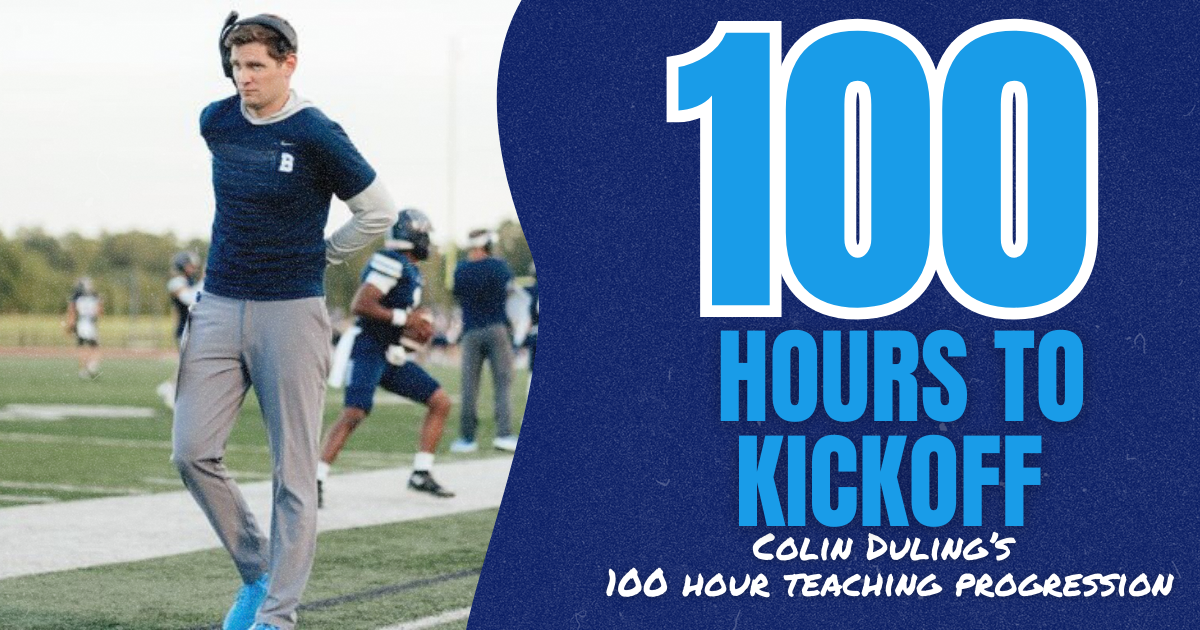
It’s easy to point to a failed play and attribute it to a flawed scheme. But for Coach Colin Duling, offensive coordinator at Bethel University, the realization came that the issue wasn’t in the playbook—it was in the execution. After reviewing film from several games and seeing his team consistently fall just short of making big plays, Duling recognized that it wasn’t a lack of creativity in their offensive schemes but a lack of thorough preparation in execution that was holding them back.
In 2022, after a particularly tough loss to a top-ranked team, Duling knew his players weren’t set up for success the way they needed to be. “We couldn’t execute at a high enough level to beat them, and we felt like we should have won that game,” he recalls. It became clear that the coaches needed to take more ownership in ensuring their players truly understood the plays inside and out. So, Coach Duling made a shift in his process, creating the “100-Hour Teaching Progression” to give players multiple touchpoints with the game plan, helping them execute with speed and confidence.
Here’s how Coach Duling and his staff break down the process across five days, ensuring their players are ready to execute when it matters most.
Tuesday: Setting the Foundation (100 Hours from Kickoff)
The first day of the week is all about laying the groundwork. Players begin their preparation 100 hours before kickoff, with five foundational touchpoints designed to introduce and reinforce the game plan.
Touchpoint #1
Play Install via App (9 a.m.) – Players receive every play from the week’s game plan directly to their phones through an app. This gives them the chance to review plays during the day, even when they’re in class or on the go. By reviewing plays early, quarterbacks and other players can engage with coaches for any questions or clarifications before practice begins.
“We’re going to have 10 touchpoints on each play in our game plan before we kick that ball off on Saturday. So these guys really understand and know exactly what we’re asking of them.” – Coach Duling
Touchpoint #2
Position Meeting – Before taking the field, position coaches break down each play in a meeting. This touchpoint focuses on the formation, responsibilities, and details that make each play successful, ensuring that every player knows what is expected of them before physically running the play.
Touchpoint #3
Walkthrough – The players walk through each play at a slow pace to make sure everyone knows their assignment. This controlled environment allows coaches to catch and fix potential mistakes before moving to a more dynamic practice session.
“Before we ever go out to the field and try to run it, we’re trying to go through the details of it. So that way we don’t waste time running it incorrectly and then having to correct it later.”
Touch Point #4
Drill Reps – Here, the offense focuses on execution, but not at full go. In a drill setting (such as routes on air for wide receivers and quarterbacks), players practice the timing, depth, and precision required to make each play work.
Touch Point #5
Scout Team Reps – The last step of the day is running the plays against the scout team, simulating the defense they’ll face on Saturday. This is their first opportunity to execute in a game-like scenario.
“We were wasting a lot of time with scout teams. We’d run a play incorrectly, then have to correct it and rep it again another day. Our new process helped eliminate that waste.”
Wednesday: Building on the Foundation (74 Hours from Kickoff)
The second day of preparation focuses on reviewing, adjusting, and reinforcing what was learned on Tuesday.
Touch Point #6
Film Review – The offense reviews video of Tuesday’s practice, focusing on both successful and unsuccessful reps. This step is key in making sure players fully understand what they did well and where adjustments need to be made.
“I emphasize showing the clip, whether it’s good or bad. I want the play to be ingrained in their minds so that on Saturday, they’ve already seen themselves execute it.”
Touch Point #7
Live Reps – Players take to the field again for another round of live speed practice. Unlike Tuesday, Wednesday focuses on the other half of the game plan. This allows the team to spread the load while ensuring a sharp focus on a smaller number of plays.
Thursday: Repetition for Perfection (48 Hours from Kickoff)
Thursday is about repetition and perfection. The team runs a combination of live reps from the entire game plan, reinforcing the key plays from both Tuesday and Wednesday.
Touch Point #8
Live Reps – This day gives players one last opportunity to fine-tune their understanding and execution before Friday’s final walk-through. By now, they should be highly familiar with the plays, and Thursday serves to refine timing and tempo.
“It’s about being really, really good at the plays on our menu, not about having a hundred-plus plays. Small, simple, direct. That’s how we accomplish it.”
Friday: Mental Preparation (24 Hours from Kickoff)
Friday shifts the focus from physical to mental preparation. It’s time for players to prove they fully understand the game plan.
Touch Point #9
Game Plan Test – The game plan test is a critical piece of the 100-hour teaching progression, focusing on mental preparation and retention. Every player, from the starting quarterback to the newest freshman, takes part. Rather than the traditional written exam, the test involves each player drawing up plays on a whiteboard and walking the team through their thought process.
The test is collaborative. Players work together in groups, sharing cues and insights on how they remember and understand plays. Each player takes turns drawing and explaining, but they also support one another, offering feedback and advice as they go. This setup allows for group learning, where one player’s interpretation might clarify or enhance another’s understanding.
“We used to have hard-copy tests, but grading and giving meaningful feedback in time was tough. Now, everyone gets a copy of the game plan, and in the test, they physically draw out each play and explain their progressions, reads, and decision-making process.“
By the end of the session, every player has had hands-on experience drawing plays, explaining concepts, and receiving immediate feedback. The test not only checks for understanding but also fosters a collective knowledge environment where younger players can learn from veterans, and even the most experienced players can pick up new insights from fresh perspectives.
It promotes more of a group feel, like everybody’s in there to help each other rather than just focusing on themselves. Players often share their own learning cues, and sometimes those cues can be totally unique or even seem crazy, but if it works for them, it could help someone else in the room, too.”
Touchpoint#10
Final Walkthrough – The team walks through the entire game plan once again, reinforcing the week’s work at a controlled pace. The goal is to leave no room for confusion or hesitation when game time comes.
“By the time I call the play on Saturday, they’re probably sick of me calling it because they know it so well.”
Saturday: Execution Day
Saturday is the culmination of the week’s preparation. But even on game day, Coach Duling ensures his team is primed for success.
Final Walkthrough (Pre-Game) – In the hours before the game, the team walks through the game plan one last time. By this point, players have reviewed and executed each play multiple times, ensuring they are prepared to perform with speed and confidence.
A Clear Understanding and Improved Execution
What sets Coach Duling’s approach apart is his focus on reinforcing each play through various methods: visual learning, walkthroughs, physical execution, and even drawing up plays on a whiteboard. The objective is for each player to understand their role so thoroughly that when they hear a play call on game day, they know exactly what to do without hesitation.
After adopting this approach, Coach Duling noticed immediate improvements. “The feedback we kept getting from our players was that they just understood what they were supposed to do so much better,” he says. This greater understanding translates into faster, more confident play, allowing the team to execute at a high level when it counts most.
For coaches looking to improve execution and understanding in their players, the 100-hour teaching progression provides a structured, repeatable method to maximize player preparation throughout the week.
By breaking down preparation into clear, actionable steps, this progression helps ensure that when game day comes, both the coaches and the players are confident that they’ve done everything they can to be successful.


